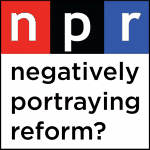
I recently came upon an article attacking New Orleans’ public schools in New York Teacher, the official magazine of the United Federation of Teachers, which represents over 200,000 educators in New York City’s public school system. The piece, written by Micah Landau, a “staff reporter” for the union (“staff reporter” apparently being UFT newspeak for “propagandist”), is filled with so many misleading and inaccurate statements that I’ve reproduced the article below with my fact-checking comments in bold.

The destruction of New Orleans’ public school system
by Micah Landau | June 26, 2014 New York Teacher issue
Call it charter school city.
The New Orleans Recovery School District has with the end of this school year shuttered its last five remaining traditional public schools, creating the country’s first all-charter school district.
This transformation has delighted corporate education reformers.
But the story of how New Orleans arrived at this point is one not of triumph, but of pain and tragedy, in which the city’s devastation from Hurricane Katrina was exploited to enact a radical program of school privatization.
Katrina hit New Orleans on Aug. 29, 2005, 10 days after the opening of school. The struggling school district — notorious for its corruption, bureaucratic incompetence and poor academic performance — had just begun a process of reform. The storm brought that process to a halt.
Fact Check: Landau’s contention that the Orleans Parish School Board had begun a process of reform before the storm is totally inaccurate. In the summer of 2005, the district was in a complete state of disarray. In April 2005, former AP reporter Adam Nossiter in fact wrote a dismal assessment of the district entitled, “New Orleans’ School System in Disarray.” If anything, the state decided to take over most of the city’s schools exactly because the district’s previous reform efforts failed.
The city’s system of public education was effectively destroyed, both physically and organizationally. Only 16 of its 128 schools came out of the storm relatively unscathed. Some others were submerged beneath five feet of water or had their roofs torn off; many had to be rebuilt from the ground up.
The human toll was also tremendous. The storm displaced hundreds of thousands, including many families with school-age children. Many people who fled the city at the time of the storm never returned. Prior to Katrina, New Orleans’ public schools enrolled 60,000 students; today that number is 33,000.
Fact Check: Landau’s current enrollment number is way off. As of October of last year, there were almost 44,800 students enrolled in public schools in New Orleans.
Corporate reformers saw in the devastation an opportunity. Noted education historian and policy expert Diane Ravitch described their formula: eliminate public schools, replace with privately managed charters, fire the teachers, replace with Teach for America recruits, eliminate the union.
Shortly after the storm, the Orleans Parish School Board, which was in charge of city schools, fired more than 7,000 unionized school employees, including the entire teaching force. The teachers union lost its collective-bargaining rights. And, the state seized control of the vast majority of the city’s schools and placed them in the state-run Recovery School District, which quickly began to replace existing schools with charters.
Before the storm, there had been just seven charter schools in the city. By the 2007–08 school year, there were 40. In September, all 58 of the schools in New Orleans will be privately run but publicly funded charters whose teachers work without union protections.
Fact Check: Landau gives the impression that the board laid off their teachers immediately after the storm, but the layoffs actually occurred 7 months after the storm, on March 24, 2006.
The decision to layoff teachers was due to the district’s dire financial circumstances. After years of fiscal mismanagement and corruption, OPSB hired Alvarez & Marsal to sift through the district’s finances in the spring of 2005. In a report issued just weeks before the storm, the firm estimated the district would run out of money by September and said:
“The conditions we have found are as bad as any we have ever encountered. The financial data that exists is [sic] unreliable, there has not been a clean audit since FY 2001-2002, there is no inventory of assets, the payroll system is in shambles, school buildings are in deplorable condition and, up to now, there has been little accountability.”
Finally, Landau states, “in September, all 58 of the schools in New Orleans will be privately run but publicly funded charters.” This is nowhere close to accurate. This fall there will be 83 public schools in New Orleans, six of which are traditional district schools overseen by the Orleans Parish School Board.
The teachers who had been fired had to reapply for teaching jobs, and although some veteran teachers were hired back, primarily at the higher-performing schools, the overwhelming number of hires at most schools were young teachers from programs such as Teach for America who had no or little experience and no history of union affiliation.
Larry Carter, the president of the United Teachers of New Orleans, said the decimation of the teachers union was critical for privatization to proceed.
Fact Check: It’s true that the Recovery School District required prospective teachers to formally apply for those positions, including OPSB veterans. Yet in retrospect, this was probably one of the wiser policy decisions made by RSD officials in the hectic months after the storm. As part of the RSD’s screening process, applicants were administered a basic skills test comprised of middle-school ELA and math questions. Half of the applicants failed the test.
Landau’s contention that “the overwhelming number of hires at most schools were young teachers from programs such as Teach For America who had no or little experience” is false. For example, in the 2007-2008 school year, 86% of the teachers working in the RSD were OPSB veterans.
Finally, Brenda Mitchell, Larry Carter’s predecessor as UTNO president, told Ed Week in 2007 that many veteran teachers were simply not interested in teaching for the RSD.
“The model used in New Orleans was to decentralize public education as well as to get rid of the union and get rid of its influence in education and politics,” he said.
Education Secretary Arne Duncan celebrated the system’s transformation in a notorious 2010 gaffe: “The best thing that happened to the education system in New Orleans was Hurricane Katrina.”
Fact Check (ok, opinion): Although Landau describes Duncan’s comment as a “gaffe,” some of us who actually worked in New Orleans’ pre-Katrina public schools prefer to describe it as “possibly the most accurate statement ever made by a high-ranking government official.”
The new system has been accused of discrimination on various fronts. A 2010 lawsuit by the Southern Poverty Law Center charging that the new schools fail to meet the needs of disabled students, including in some cases refusing to enroll them, has led to settlement talks between the plaintiffs and schools. And this May, a group of community activists filed a federal civil rights complaint alleging that the closure of the city’s traditional public schools and the expansion of its charter sector have disproportionately affected African-American and other minority students.
Fact Check: As I’ve written previously, the Southern Poverty Law Center has a history of stage-managing accusations of wrongdoing at New Orleans charter schools. As for the substance of their complaint, education professor Andre Perry – a frequent critic of the RSD – recently stated:
“I believe the Southern Poverty Law Center incorrectly suggests the highly decentralized charter system in New Orleans is a cause for the educational malpractice against students with special needs. Families with children who were in the system before Katrina merely had their balloons of hope popped by unmet expectations. Parents including myself wanted to see more. Unmet expectation around special education is not a post-Katrina phenomenon.”
It’s also not surprising that Landau raises the federal civil rights complaint filed in May by the Journey For Justice Alliance. As I documented in a previous post, UFT’s parent organization, the American Federation of Teachers, played a leading role in drafting the complaint. The complaint is filled with so many illogical errors that Louisiana State Superintendent John White said “The report, from a factual perspective, is a joke.”
On top of the charges of discrimination is evidence that the new, privatized schools perform no better than the public school system before the storm.
Student scores on state tests this spring put New Orleans schools in the 17th percentile among all Louisiana public school districts, just about where they ranked pre-Katrina, said Louisiana educator and researcher Michael Deshotels in an analysis of test results.
The purported success of the transformed system is a “great big fraud,” Deshotels wrote. “After more than eight years of state takeover and conversion of public schools in Louisiana into privately run charter schools, even the most ardent promoters of this radical privatization experiment can no longer hide its spectacular failure.”
Fact Check: As Dawn Roth wrote in an article in the December edition of New Orleans Magazine:
”No matter how many statistics come from the Louisiana Department of Education showing the substantial gains in student achievement in New Orleans schools since 2005, there’s a stubborn knot of naysayers who insist that the stats are the result of a conspiracy by a dishonest government and power-hungry reformers.”
Michael Deshotels is one of these conspiracy theorists. Deshotels and others always fall back on the unsubstantiated assertion there has been an ongoing conspiracy to manipulate the RSD’s performance results. In short, although NSA couldn’t keep their domestic spying programs secret for 10 years, Deshotels & Co. would have us believe that the bureaucrats at Louisiana Department of Education have been able to keep their data manipulation efforts under wraps for nearly a decade. The whole idea would be laughable if not for the fact that these conspiracy theorists actually believe their assertions.
In reality, New Orleans’ public schools have vastly improved since Hurricane Katrina. Here are just a few of the statistics documenting the progress since 2005:
- The average school performance score has risen by 41%, in spite of the fact that 84% of students are eligible for free or reduced-price lunch
- The high school graduation rate increased from 54% to 78%, which now surpasses the Louisiana rate of 71%
- The percentage of high school seniors eligible for TOPS scholarships (free or subsidized in-state college tuition) rose from 25% to 39%, approaching the state average of 43%
- The percentage of 8th graders performing on grade level in Math and English rose from 28% to 67%, just one point shy of the state average of 68%
- The performance of special education students in New Orleans now outperforms the state average for students with special needs
- New Orleans has achieved these gains while maintaining an expulsion rate lower than the state average


12 Comments
Leave a Reply